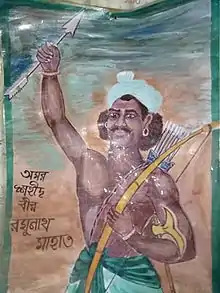Raghunath Mahato
Raghunath Mahato (21 March 1738 – 5 April 1778) was an Indian revolutionary main leader of the Chuar rebellion from the Kudmi Mahato community.[1][2][3][4] He led a revolt against the East India Company in 1769.[5][6][7][8]
Raghunath Mahato | |
|---|---|
 Drawing of Raghunath Mahato | |
| Born | 21 March 1738 |
| Died | 5 April 1778 (aged 40) |
| Nationality | Indian |
| Known for | Chuar Rebellion Indian Independence Movement Social Worker |
Overview
Raghunath Mahato was born on 21 March 1738 in Ghutiadih (Butparsa Ghutiadih) village of Nimdih block of Seraikela Kharsawan district.[9][10][11]
The Rebellion against British was known as Chuar rebellion. Chuar means looter. When British started to collect taxes in 1765 when they won Battle of Buxar and got rights to collect taxes from Bihar and Bengal.[12] But people opposed it as People thought British were depriving their rights. Some zamindars joined British while other rebeled against them. In 1769, Raghunath Mahato led Kudmi Mahato people against British.[7][13] His slogan was:
... "Apan Gaon, Apan Raij; Dhur Kheda British Raij".
When British asked the zamindars about identity of rebels, zamindars said the rebelious people are Chuar means looter, thieves, nasty people, barbarian, uncivilized, and arrogant.[14][15][16] The people who rebeled were belongs to many ethnic groups such as Kudmi Mahato,[17][18][19][20] Bhumij, Bagdi, Bauri, and others.
On 5 April 1778, Raghunath Mahato and his team who were planning to snatch weapons from British forces in the forest. In this skirmish Raghunath Mahato and several other rebels died fighting British forces.[10][11][8]
References
- Singh, Kumar Suresh (1992). People of India: West Bengal. Anthropological Survey of India. ISBN 978-81-7046-300-9.
- IPS, Sanjay Singh (29 November 2021). JPSC GENERAL STUDIES PRELIMS EXAM GUIDE – SANJAY SINGH, IPS (HINDI) (in Hindi). Prabhat Prakashan. ISBN 978-93-5488-002-5.
- Singh, Kumar Suresh (2008). People of India: Bihar, including Jharkhand (2 pts). Anthropological Survey of India. ISBN 978-81-7046-303-0.
- Pandey, Binay Kumar (19 March 2022). Jharkhand Ke Veer Shaheed (in Hindi). Prabhat Prakashan. ISBN 978-93-5562-010-1.
- "277th birth anniversary of Rev. Shahid Raghunath Mahato, the great leader of Chuaad Uprising". Prabhatkhabar.com. Retrieved 24 November 2018.
- "ST status to Kurmis". telegraphindia. 18 April 2006. Retrieved 4 December 2019.
- झारखंड। लेखकः डाॅ अनुज कुमार धान एवं मंजू ज्योत्स्ना। प्रकाशकः प्रकाशन विभाग सूचना और प्रसारण मंत्रालय। भारत सरकार। प्रकाश कालः 2008। पृष्ठाः 113।
- रघुनाथ महतोः विद्रोही "दी ग्रेट"। (चुहाड़ विद्रोह का संक्षिप्त वृत्तांत)। लेखकः डाॅ शशी भूषण महतो एवं रतन कुमार महतो। प्रकाशकः आदिवासी कुड़मी समाज, राँची। प्रकाश कालः 2010। पृष्ठाः 1-12।
- "अंग्रेजी सत्ता के खिलाफ चुहाड़ विद्रोह के नायक रघुनाथ महतो". hatakshep. 22 March 2021. Retrieved 3 October 2022.
- "चुआड़ विद्रोह के नायक थे वीर शहीद रघुनाथ महतो". livehindustan. 22 March 2021. Retrieved 3 October 2022.
- Mahto, Shailendra (1 January 2021). Jharkhand Mein Vidroh Ka Itihas (in Hindi). Prabhat Prakashan. ISBN 978-93-90366-63-7.
- Ranendra (30 April 2014). Gayab Hota Desh (Hindi) (in Hindi) (Hindi ed.). Penguin UK. ISBN 978-93-5118-748-6.
- Luhar, Sahdev (25 February 2023). Folklore Studies in India: Critical Regional Responses. N. S. Patel (Autonomous) Arts College, Anand. ISBN 978-81-955008-4-0.
- Pfeffer, Georg; Behera, Deepak Kumar (1997). Contemporary Society: Tribal Studies : Professor Satya Narayana Ratha Felicitation Volumes. Concept Publishing Company. ISBN 978-81-8069-534-6.
- Singh, Kumar Suresh (1985). Tribal Society in India: An Anthropo-historical Perspective. Manohar. ISBN 978-81-85054-05-6.
- Encyclopaedia of Scheduled Castes and Scheduled Tribes. Institute for Sustainable Development. 2000. ISBN 978-81-261-0655-4.
- Burman, B. K. Roy (1994). Tribes in Perspective. Mittal Publications. ISBN 978-81-7099-535-7.
- "Adivasi Resistance in Early Colonial India (Comprising the Chuar Rebellion of 1799 By J.C. Price and Relevant Midnapore District Collectorate Records from the Eighteenth Century) | Exotic India Art". www.exoticindiaart.com. Retrieved 7 December 2022.
- Bayley, H.V. (1902). Memoranda of Midnapore. Calcutta. pp. 10–12.
{{cite book}}: CS1 maint: location missing publisher (link) - Das, Narendranath (1956). History of Midnapore. Vol. 1. Midnapore. pp. 20–21.
{{cite book}}: CS1 maint: location missing publisher (link)